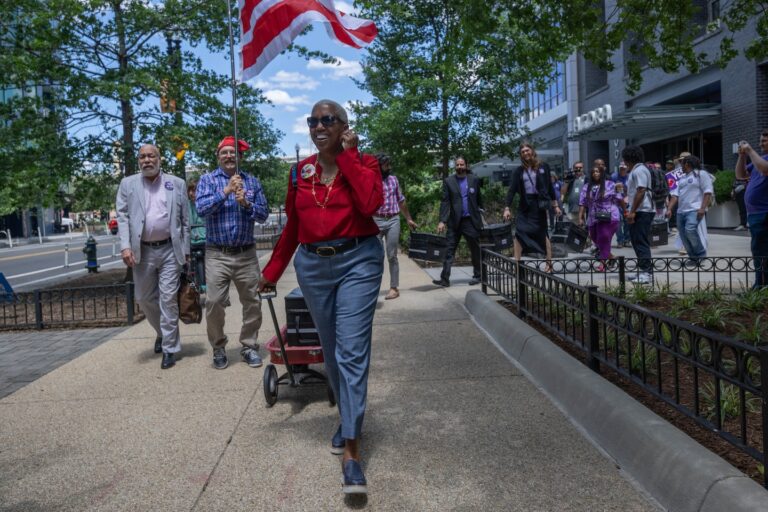If enough signatures are found to be valid, Initiative 83 would appear on the November ballot — and if voters approve it, I-83 could shake up D.C. elections. Under the proposal, the primaries would be opened up to thousands more people, while changing how votes are tabulated on election night. Currently, more than 70,000 registered independents can’t participate in any primaries, including the Democratic primary, which in deep-blue D.C. is often the decisive race. Meanwhile, ranked-choice voting would allow voters to rank candidates by preference, a method intended to ensure that the winner receives more than 50 percent of the vote.
“We want full democracy here in D.C.,” Lisa D.T. Rice, a Ward 7 advisory neighborhood commissioner who started the ballot initiative, said Monday, explaining why the two election changes are paired. “We need ranked-choice voting to make politicians accountable to us — and the 73,000 people who have been disenfranchised from voting.”
Addressing supporters Monday, Rice, a registered independent, grew emotional as she described why she was compelled to lead the initiative. “It is the right of independents to be able to vote in taxpayer-funded elections,” she argued. On primary Election Day last month, Rice stood outside the polls in Ward 7 wearing a placard that said, “I cannot vote today. Ask me why.”
But bringing ranked-choice voting to D.C. would likely be the biggest change, felt by all voters citywide. Rice pointed to the Ward 7 campaign to fill the seat being vacated by council member Vince Gray (D) as a prime example of why ranked-choice voting is needed: In the crowded 10-candidate Democratic primary, the winner, Wendell Felder, came away with only 23.7 percent of the vote.
“Let me tell you, 10 candidates — that was a gift to this movement,” Rice said, “because I didn’t have to explain, why ranked-choice voting? So many people said to me, ‘I didn’t know what to do. I think these four or five people are so good — I don’t know how to choose.’ Wouldn’t you like it if you could choose one and rank the rest? Every time, the answer was yes.”
But the movement also has plenty of opponents.
One signature gatherer, Adrian Salsgiver, said he asked Mayor Muriel E. Bowser (D) to sign the petition — but she declined, which Bowser’s office confirmed. During a May community meeting, Bowser had said she hopes “that nobody votes for that” if it gets on the ballot, calling ranked-choice voting a “bad idea, and it’s not necessary.”
Among the 17 D.C. Council candidates who participated in a Washington Post survey ahead of the June primary, only three said they supported the initiative (none of whom won). The D.C. Democratic Party has filed a lawsuit seeking to block the initiative from moving forward, believing only registered Democrats should participate in a Democratic primary and that the initiative violates their rights to freely associate with a political party. They also disagree that ranked-choice voting should be paired with allowing independents to vote in primaries on the ballot initiative. While a judge threw out the case in March, it’s on appeal.
The ball0t initiative process can be wonky. Here’s what to know about what’s next:


